 Petzlover
Petzlover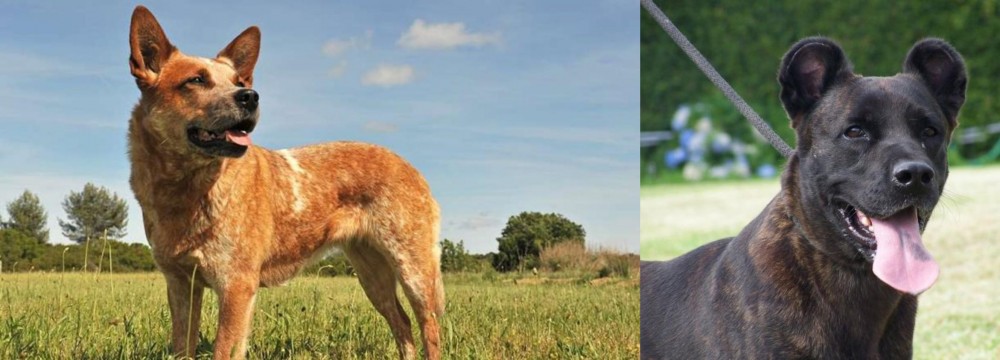 Australian Red Heeler is originated from Australia but Cao Fila de Sao Miguel is originated from Portugal. Australian Red Heeler may grow 10 cm / 3 inches shorter than Cao Fila de Sao Miguel. Australian Red Heeler may weigh 25 kg / 55 pounds lesser than Cao Fila de Sao Miguel. Both Australian Red Heeler and Cao Fila de Sao Miguel has same life span. Australian Red Heeler may have less litter size than Cao Fila de Sao Miguel. Australian Red Heeler requires Moderate Maintenance. But Cao Fila de Sao Miguel requires Low Maintenance
Australian Red Heeler is originated from Australia but Cao Fila de Sao Miguel is originated from Portugal. Australian Red Heeler may grow 10 cm / 3 inches shorter than Cao Fila de Sao Miguel. Australian Red Heeler may weigh 25 kg / 55 pounds lesser than Cao Fila de Sao Miguel. Both Australian Red Heeler and Cao Fila de Sao Miguel has same life span. Australian Red Heeler may have less litter size than Cao Fila de Sao Miguel. Australian Red Heeler requires Moderate Maintenance. But Cao Fila de Sao Miguel requires Low Maintenance
 When George Hall arrived in the New South Wales Colony in 1802 he set about ‘creating’ a tough working- or herding dog. By crossing Australia’s native Dingoes with Collies as well as with other herding dogs, the robust Red Heeler, also known as the Australian Cattle Dog came into being. Today he is a thick-set dog, ideally suited to working livestock.
When George Hall arrived in the New South Wales Colony in 1802 he set about ‘creating’ a tough working- or herding dog. By crossing Australia’s native Dingoes with Collies as well as with other herding dogs, the robust Red Heeler, also known as the Australian Cattle Dog came into being. Today he is a thick-set dog, ideally suited to working livestock.
Ranchers, particularly, were impressed with the breed’s toughness and they were sought after on cattle stations. The name actually comes from them when the dogs are herding animals, they nip at their heels to get them moving.
The Blue Heeler and the Red Heeler breed are the exact same dog, but just different colors. These Australian cattle dogs originated in Australia in the mid-1800s and adapted well to the harsh desert environment of the outback.
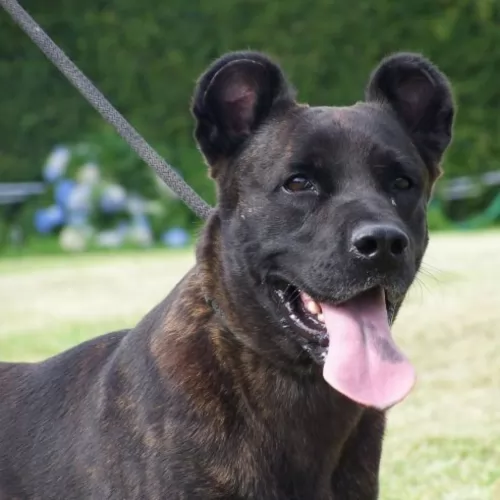 This Molosser type dog originated on Sao Miguel Island in the Azores, a region of Portugal. Known also as the Sao Miguel Cattle Dog or the Azores Cattle Dog, the existence of the Cao Fila de Sao Miguel has been documented since early in the 19th century.
This Molosser type dog originated on Sao Miguel Island in the Azores, a region of Portugal. Known also as the Sao Miguel Cattle Dog or the Azores Cattle Dog, the existence of the Cao Fila de Sao Miguel has been documented since early in the 19th century.
The dog has always been used as a cattle dog but today it remains rare outside of Portugal. In was in 1984 in Portugal that the first written breed standard was published in Portugal. The Cao Fila de Sao Miguel then earned recognition with the Portuguese Kennel Club.
 The Red Heeler or Australian Cattle Dog is a sturdy, muscular dog with ears that are pricked and with dark, alert eyes. The tail is long. The neck, shoulders and legs of the Red Heeler are strong and muscular. The dog is longer than tall – the length of the body is greater than the height at the withers. A well fed, well exercised, well cared for Red Heeler will weight roughly 15–22 kilograms.
The Red Heeler or Australian Cattle Dog is a sturdy, muscular dog with ears that are pricked and with dark, alert eyes. The tail is long. The neck, shoulders and legs of the Red Heeler are strong and muscular. The dog is longer than tall – the length of the body is greater than the height at the withers. A well fed, well exercised, well cared for Red Heeler will weight roughly 15–22 kilograms.
There are 2 coat colours of the Reeler – red and blue, but there are are lesser varieties such as chocolate, cream, blue mottled, brindle and some with white markings. It is interesting to note that with both the Red- and the Blue Heeler, puppies are generally born white, with the coat turning to red as they mature.
These Australian Cattle Dogs display patches of solid colour, and you might well find masks over one or both eyes and a white tip to the tail. Both the Red and Blue Heeler can have a white star on the forehead which is referred to as the Bentley Mark. The Heelers have a double coat - short, straight outer hairs while the undercoat is short, fine and dense. Despite their short coat, they shed a lot.
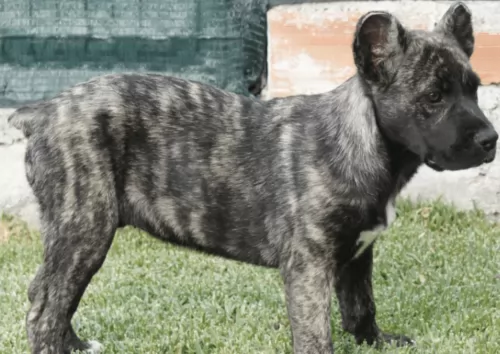 The Cao Fila de Sao Miguel is a medium to large sized dog standing 50 – 61cm in height and weighing 25 – 41kg. As with all molossers, the dog has powerful jaws.
The Cao Fila de Sao Miguel is a medium to large sized dog standing 50 – 61cm in height and weighing 25 – 41kg. As with all molossers, the dog has powerful jaws.
This dog breed has muscular limbs and dark brown eyes. The ears are normally docked into a rounded shape much like that of the Hyena. The tail has always been docked at the 2nd or 3rd vertebra but these days with regulations surrounding docking, the tail is unfortunately left long.
The coat of the Cao Fila de Sao Miguel is short and smooth while the hair on the tail and thighs is a bit longer. The Cao Fila de Sao Miguel is always brindled, and comes in shades of fawn, brown, gray or black. A white mark on the forehead around the chest or on the paws is also often seen.
The Cão de Fãila de São Miguel is a working dog who is used to guarding livestock. He is an athletic dog, game for plenty of action, and he will require plenty of daily exercise. He is territorial and makes an excellent guard dog, but even so, when it comes to his own owner and human family, he is gentle and loving.
The Cao de Fila de Sao Miguel is an intelligent dog and he will need training and socialization which allows him to get on well with children in the home as well as other pets.
 Your Australian Red Heeler needs plenty of exercise but also plenty of companionship too from his human family. He is an affectionate, playful pet but is reserved with people he doesn’t know. When socialized he is patient with children in the home but he does still have the tendency to herd them and nip at their heels. The dog builds up a strong bond with his human family, and is protective toward them, being happy to be close to his owner’s side.
Your Australian Red Heeler needs plenty of exercise but also plenty of companionship too from his human family. He is an affectionate, playful pet but is reserved with people he doesn’t know. When socialized he is patient with children in the home but he does still have the tendency to herd them and nip at their heels. The dog builds up a strong bond with his human family, and is protective toward them, being happy to be close to his owner’s side.
Red Heelers need activities and lots of room to play, and they therefore won’t adapt to apartment living. If you don’t live on a farm, don’t neglect your working dog as he will need lots of rough and tumble games and activities to keep him from boredom. Treat your Australian Red Heeler with the love, patience and kindness and you’ll bring out the very best from this active, loyal fur-friend of yours.
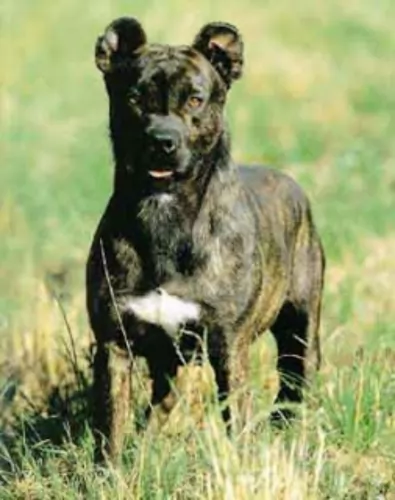 The Cão de Fila de São Miguel is a natural guard dog who will love and guard his family. With training and socialization he can become a devoted and gentle family dog with children and with other pets. They can be aloof with strangers.
The Cão de Fila de São Miguel is a natural guard dog who will love and guard his family. With training and socialization he can become a devoted and gentle family dog with children and with other pets. They can be aloof with strangers.
The Cão de Fila de São Miguel is an active dog who wants to be busy, and he is therefore better suited to country living rather that in a small home where space is limited.
Intelligent, a fast learner, protective and territorial, the Cão de Fila de Sao Miguel is an aggressive, hardy working breed who is also an excellent guard dog and protector. With firm training he becomes loyal, lovable and devoted – an ideal family companion.
 The Australian Cattle Dog is quite often affected by progressive retinal atrophy, an eye condition where the rods and cones in the retina of the eye deteriorate later in life, and it could lead to blindness. This eye illness is an autosomal recessive trait, and even if the dog doesn’t develop the condition himself, he can be a carrier of the affected gene.
The Australian Cattle Dog is quite often affected by progressive retinal atrophy, an eye condition where the rods and cones in the retina of the eye deteriorate later in life, and it could lead to blindness. This eye illness is an autosomal recessive trait, and even if the dog doesn’t develop the condition himself, he can be a carrier of the affected gene.
The Heeler is just bursting with personality and energy and a study of dogs diagnosed at veterinary colleges described fractures and ligament tears as one of the most common conditions treated with the Australian Red Heeler.
You love your Australian Red Heeler and you want to take good care of him. Check with your vet because at 8 weeks he should be starting with his first puppy vaccinations.
To keep your best friend healthy and happy, watch his diet, ensure he gets plenty of exercise, brush his teeth regularly to remove plaque build-up, and always call your veterinarian when you see he is ill and isn’t his usual boisterous self.
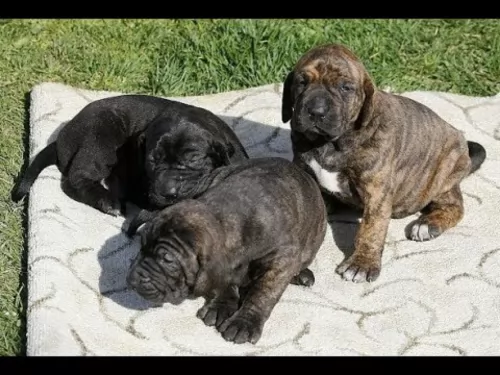 The Cao Fila de Sao Miguel is a dog who enjoys exceptional health. When you do research you see there aren’t really any particular illnesses plaguing this dog, and he can actually live to be 15 years of age. Be aware of some illnesses as they are common among different dog breeds – hip- and elbow dysplasia, bloat, eye diseases such as progressive retinal atrophy and cataracts, heat intolerance and arthritis.
The Cao Fila de Sao Miguel is a dog who enjoys exceptional health. When you do research you see there aren’t really any particular illnesses plaguing this dog, and he can actually live to be 15 years of age. Be aware of some illnesses as they are common among different dog breeds – hip- and elbow dysplasia, bloat, eye diseases such as progressive retinal atrophy and cataracts, heat intolerance and arthritis.
This is a dangerous illness that can affect any dog – small or large. This is when the dog’s stomach fills with fluid or gas so that it expands. The stomach then puts pressure on other organs and your dog can have trouble breathing. There is also no blood flow to the heart. Sometimes the stomach of the dog twists and your pet can go into a state of shock. Recognize the symptoms of bloat – a swollen stomach, drooling and wanting to vomit but nothing coming up. Get your dog to the vet immediately.
An abscess can be so painful for your pet often when your dog has a thick coat it could go undetected. If an abscess on your pet doesn’t burst, or even if another abscess appears, a vet must be consulted and a course of antibiotics given.
Ear mites, dirt and a build up of wax may cause your dog to scratch at the ear, shake his head or hold it on one side. There may even be a foul-smelling discharge. Your dog will need to have his ears cleaned. Special ear drops can rectify the problem. Remember that hot, red ears will require veterinary attention.
 The Australian Red Heeler is a low maintenance dog. He does shed quite a bit so you’ll need to brush his coat at least twice a week to remove loose hairs and to keep his coat lustrous. When your dog has been in a particularly dusty area, you you wipe his coat down with a damp cloth. As with all dogs, you’ll want to check his teeth, ears, eyes and nails regularly to avoid health problems.
The Australian Red Heeler is a low maintenance dog. He does shed quite a bit so you’ll need to brush his coat at least twice a week to remove loose hairs and to keep his coat lustrous. When your dog has been in a particularly dusty area, you you wipe his coat down with a damp cloth. As with all dogs, you’ll want to check his teeth, ears, eyes and nails regularly to avoid health problems.
If you care for your working- and herding dog you’ll train him to that he becomes a good family dog and companion. The Red Heeler has plenty of energy and stamina and if he grows up untrained and un-socialized, you could see him becoming aggressive towards other animals and even your own children. He certainly becomes over-protective of his territory if not socialized. Train him as he is an intelligent breed and responds well to training.
Any vet will tell you of the critical importance of a proper diet and exercise routine for your dog. He’s an active, smart dog with loads of energy and you want to keep his diet consistent with this energy. Speak to your vet about what food would suit your pet best, because a high quality diet appropriate to his age, his body size and his energy levels will be important. Along with high quality foods which include a good intake of raw meat, your dog must always have access to a bowl of fresh, cool water.
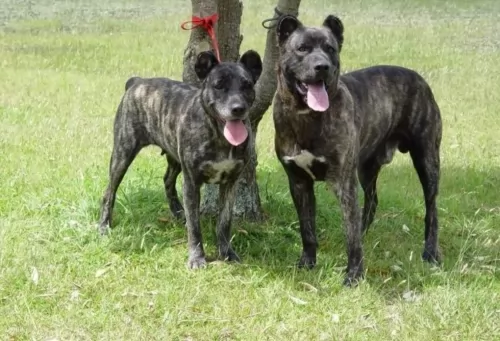 The Cao Fila de Sao Miguel is a low maintenance breed and all that will be required for him is that you give him a thorough brushing a couple of times a week.
The Cao Fila de Sao Miguel is a low maintenance breed and all that will be required for him is that you give him a thorough brushing a couple of times a week.
The Cao Fila De Sao Miguel puppy will require four meals of puppy food a day. The adult Cao fila de sao miguel can go down to 1 or 2 meals a day after his 1st birthday.
These days you get some excellent commercially manufactured dog foods and your veterinarian can help you choose one suited to this particular dog breed. Add in some home-made vegetables, rice and meat every now and then. The idea is to make sure your dog is getting in all the minerals and vitamins he needs.
There is evidence showing that dogs who enjoy raw meat every now and then enjoy a number of health benefits. Skin and teeth are improved, your dog has a shinier coat, less allergies,less inflammation and he is more relaxed and amicable. Ensure a constant supply of fresh, cool water in a clean bowl and at all times.